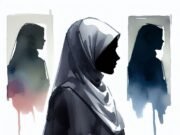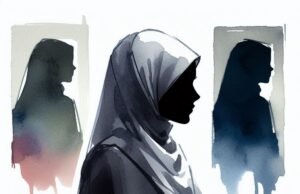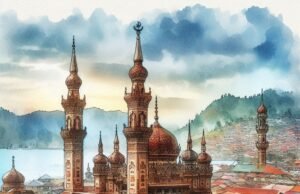A thousand years a go, in the bustling market square of Basra. Where the scent of spices mingled with the call to prayer, there lived a wise qadi named Ibrahim. His white beard cascaded like a waterfall, and his eyes held the weight of countless verdicts. People sought him out—their disputes, like tangled threads, waiting to be unraveled.
One scorching afternoon, a merchant named Khalid appeared before Qadi Ibrahim. Khalid’s face bore the lines of a life spent haggling over silks and dates. He clutched a parchment—the heart of his grievance.
“Qadi,” Khalid began, “my neighbor, Ali, claims that my camel trampled his prized roses. He demands compensation. But I swear by the Prophet’s name, my camel is innocent!”
Qadi Ibrahim leaned back, his wooden chair creaking. The sun painted patterns on the mosaic floor. “Bring forth the witnesses,” he commanded.
Ali stepped forward, his robe dusty from tending the garden. “Qadi,” he said, “my roses were my joy. They bloomed like promises. Now they lie crushed, their petals weeping.”
The market buzzed with anticipation. The crowd loved a good dispute—their lives woven with threads of intrigue.
Qadi Ibrahim listened to both sides—their voices like the scales of justice. He pondered the ancient texts—the Quran and the Hadiths—where guidance awaited like buried treasure.
“Ali,” Qadi Ibrahim said, “you claim your roses were trampled. But can you prove it?”
Ali hesitated. “I saw the hoof prints,” he said. “And my neighbor’s camel—its eyes, like guilty moons.”
Khalid clenched his fists. “My camel is innocent,” he insisted. “It trod carefully, like a pilgrim at Mecca.”
The crowd leaned in, their breaths held. Qadi Ibrahim’s mind raced—a river seeking its course.
He invoked the early Islamic law—the fiqh that flowed from the Prophet’s wisdom. “Ali,” he said, “bring forth the witnesses.”
Ali’s eyes widened. “Witnesses?” he stammered. “I—I have none.”
“But I do,” Khalid declared. He beckoned to a young boy—a shepherd who tended his goats on the outskirts of Basra.
The boy stepped forward, his sandals dusty. “I saw it all,” he said. “The camel tiptoed, like a dancer avoiding thorns. Ali’s roses remained untouched.”
The crowd gasped. Qadi Ibrahim nodded. “The truth,” he said, “is like a hidden spring—it surfaces when least expected.”
He ruled in favor of Khalid—the merchant’s camel absolved, the roses spared. Justice flowed like cool water, quenching the parched earth.
As the crowd dispersed, Qadi Ibrahim watched the boy—the shepherd who saw what others missed. “Your eyes,” he said, “are sharper than the falcon’s.”
The boy grinned. “My father taught me,” he replied. “He said wisdom is a river, and we’re all thirsty travelers.”
And so, in the shade of the date palms, Qadi Ibrahim pondered the boy’s words. Early Islamic law—the fiqh—was indeed a river, winding through hearts and minds, seeking justice beneath the scorching sun.
And thus, the tale of the qadi and the trampled roses became a whispered lesson—a ripple in the river of time. For in Basra, justice flowed not in grand pronouncements, but in the footprints of camels and the eyes of young shepherds.














